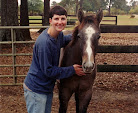Lupin and I just got back from our first Parelli clinic since Colorado, and it was astoundingly refreshing. I forget, for one thing, how nice it is just to be around Parelli people, who are so calm about things that normal horse folk freak out about (like a horse left loose in the ring during a lesson). And then there's the delightful feeling of your brain really processing things as you hit one A-ha moment after another.
I had a lot of A-ha moments courtesy of Dan. Many of these are cumulative: you've heard it before, you've felt it in action, and yet it can be a long time before it clicks in your brain in a way that is habit-changing rather than just intellectually interesting.
In terms of taking things personally, I watched Dan give a private lesson where the horse was being super dominant. Dan showed the owner how to apply an action/consequence way of thinking to deal with the horse: the horse still gets to choose what to do, but certain choices have consequences. You're not punishing the horse, or forcing him to do something different; you're just showing him that sometimes he needs to make a better choice. So, for instance, rather than chasing the horse out of his space, Dan turned his back on the horse and gave a big yawn and a bigger stretch that just happened to land on the horse's mouth.
Oh. Look what might happen when you stand too close. Action, consequence.
The next morning, we were horse-shoed up, and Lupin was playing his usual game of creeping forward between me and whoever was talking. As I listened to Dan, part of my brain noticed how difficult it was for me to ask Lupin to back up, and I realized that's because I was thinking of being assertive with Lupin in personal terms: that he was challenging me, and doubting my leadership, and I had to prove it to him. Yes, that's probably what was going on, but for Lupin there's no emotion in that--it is truly just a game. For me it's an assault on my sense of myself. Sometimes that makes me angry ("How dare he!"), but more often it just makes me tired ("I can't believe I have to stand up for myself again.")
Note that just the physical action of backing Lupin up takes very little effort--in fact, I was sitting down, and all I had to do was lift my stick. It's the psychic energy of powering up for a perceived emotional confrontation that's draining.
Later, on board, I was asking Lupin to stay on the circle using John's method: if the horse comes off the circle, you get very buzzy--your energy comes up, you use your aids quickly and with a lot of noise--so that the horse wants to get back on the circle where you're calm and quiet. Lupin took this a little personally--or at least got impulsive. I just kept playing my game as he went up to a trot, then a canter, then finally back to down to a trot. But I noticed on one circle toward the end a slight hesitation: I waited longer than I should because I didn't want to apply the aid. Maybe it was because I wanted to believe he was with me, or because I was tired of being assertive, but there it was again: that emotional reluctance to be assertive.
It was a quick mental fix for me, though, when I thought about the action/consequence idea. You don't have to make being assertive a personal issue, and it doesn't have to cost you emotional energy. As soon as I started thinking just in terms of the actions, I had no problem: Lupin comes off the circle, I use my leg. There's no emotion there, whether it be hope for Lupin to do better, worry that I'm doing wrong, feeling inadequate because Lupin isn't with me. It's just an action and a consequence. The circle game was a good one for this because it is so clear and simple.
I'll be curious to see how this realization continues to work for me. I think a lot of the strength of it comes from the fact that it's hard to work off of negative stimuli ("don't make it personal") and much easier to change a habit when you have a positive model to substitute in place of your old mental habit (action/consequence rather than provocation/emotional reaction).
Thanks to Parelli, as always, for giving us so many new positive models.




No comments:
Post a Comment